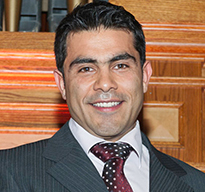Applied Machine Learning for Petroleum Engineers and Geoscientists
Disciplines: Data Science and Engineering Analytics | Reservoir
Course Description
This course introduces the theory and fundamentals of machine learning and data analytics techniques. This is a hands-on course and participants will apply data analytics and machine learning methods using real field examples. The course covers the following topics with specific applications and examples in petroleum engineering:
- Overview of Data Analytics
- Introduction to programming - Python
- Clustering techniques
- Dimensionality reduction and feature extration techniques
- Classification techniques
- Predictive Models
- TIBCO Geospatial Analytics and Streaming Analytics
Seats are limited to 20 participants, register now to save your seat
Learning Level
Introductory
Course Length
2 Days
Why Attend
By the end of the course, participants will:
- Learn basic programming with Python
- Learn data pre-processing
- Understand the fundamentals of applied machine learning techniques
- Analyse the data and obtain insightful knowledge
- Be familiar with different machine learning tools
- Implement data analytics and machine learning techniques
Who Attends
This course is for reservoir and production engineers, geologists and geophysicists interested in exploring the field of Data Analytics and would like to learn to implement different data analytics and machine learning techniques on large data sets.
No previous programming experience is required.
Special Requirements
Participants must bring their laptop for in-class exercises
Cancellation Policy
All cancellations must be received no later than 14 days prior to the course start date. Cancellations made after the 14-day window will not be refunded. Refunds will not be given due to no show situations.
Training sessions attached to SPE conferences and workshops follow the cancellation policies stated on the event information page. Please check that page for specific cancellation information.
SPE reserves the right to cancel or re-schedule courses at will. Notification of changes will be made as quickly as possible; please keep this in mind when arranging travel, as SPE is not responsible for any fees charged for cancelling or changing travel arrangements.
We reserve the right to substitute course instructors as necessary.
Instructors

Dr Mohammad Sayyafzadeh is a senior lecturer in reservoir engineering at the University of Adelaide. He has solid background in the field of mathematical physics and computational mathematics (specifically, optimisation, machine learning, geostatistics, uncertainty quantification and numerical simulation). Mohammad enjoys conducting research, solving problems and teaching courses in an expansive range of engineering and geosciences subjects, such as field development, water-flooding optimisation, Hydrogen and CO2 storage and reservoir characterisation. He has co-authored more than 45 papers, and developed and taught many courses and technical workshops, including machine learning and uncertainty modelling. Mohammad holds a B.Sc. in Chemical Engineering and M.Sc. in Advanced Reservoir Engineering, both from Tehran Polytechnic, and has a PhD in Petroleum Engineering from the University of Adelaide, completed in 2013.

Abbas Zeinijahromi is Senior Lecturer in Petroleum Engineering at the University of Adelaide. He hold a BEng degree in Production Engineering, a MSc degree in Reservoir Engineering and a PhD degree in Petroleum Engineering. He has been teaching petroleum engineering courses for over 10 years, particularly "Data analytics in oil and gas industry" at the Australian School of Petroleum and Energy Resources (ASPER). Dr Zeinijahromi has over 80 publications. His current work is focused on "multi-phase flow in porous media" with application in "CO2 Storage (CCUS)", "Low Salinity Waterflooding", "Formation Damage", and "EOR".
Other courses by these instructors
Pavel Bedrikovetsky
Abbas Zeinijahromi
Currently, about 65% of worldwide oil is produced by waterflooding, produced water re-injection (PWRI), and production with strong water support. Yet, formation damage is a serious obstacle for oil- and gasfield development as well as subsurface CO2 st...
(Read More)Disciplines: Production and Operations | Reservoir
